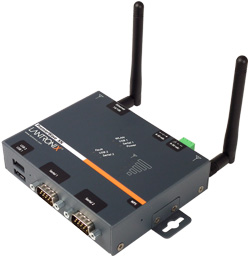It is now much more common than not to have a wireless network in your home. Many broadband ISPs are actually bundling routers with their service that acts as a wireless access point. That means that, chances are, you and many of your neighbors are using wireless.
So, pop open your laptop computer and have it look for available wireless networks. Do you see a few that are not your’s? In most cases, you will. If any of those networks are not secured, that means you can connect to your neighbor’s network and freeload on their Internet connection.
And if you can see them, chances are they can see you.
Some people don’t mind allowing others to use their broadband? Some people choose to follow the altruistic approach and just allow it. After all, chances are we’ve all been on the other end before and found ourselves temporarily using somebody else’s connection.
If you don’t have any file sharing enabled and use a firewall on your computer, then most likely you’re OK allowing others to freeload on your network. However, I would never say you are totally safe. There are hackers out there who can break through almost anything. Now, what are the chances that you have skilled hackers in your neighborhood? Well, I’ll leave that one to you.
The most secure option, though, is not to allow anybody to freeload on you.
So, pop open your laptop computer and have it look for available wireless networks. Do you see a few that are not your’s? In most cases, you will. If any of those networks are not secured, that means you can connect to your neighbor’s network and freeload on their Internet connection.
And if you can see them, chances are they can see you.
How Do You Know?
How would you know if somebody is freeloading on you? Well, it isn’t hard to tell.- Many wireless routers provide a way to view existing connections. Sometimes called a “LAN Client List”.
- You can run the Windows command line utility NETSTAT to view all incoming connections.
- The easiest way would be to use a utility like Network Magic. It has the ability to graphically show you all devices connected to your network. You can try it for free for 7 days – enough to see what’s going on.
Should You Stop It?
OK, so if you’ve determined you are inadvertently allowing your home to act as a public wifi hotspot, you have the choice to leave it running or turn it off.Some people don’t mind allowing others to use their broadband? Some people choose to follow the altruistic approach and just allow it. After all, chances are we’ve all been on the other end before and found ourselves temporarily using somebody else’s connection.
If you don’t have any file sharing enabled and use a firewall on your computer, then most likely you’re OK allowing others to freeload on your network. However, I would never say you are totally safe. There are hackers out there who can break through almost anything. Now, what are the chances that you have skilled hackers in your neighborhood? Well, I’ll leave that one to you.
The most secure option, though, is not to allow anybody to freeload on you.
How To Stop Freeloading
Here are the basic steps you need to take to kick off the freeloaders:- Turn off SSID broadcasting. The SSID is a short string which identifies your network. When you detect wireless networks and few a list of those available, that list is showing the SSIDs of those networks. Your wireless router has an option to stop broadcasting that SSID. What this means is that you, of course, still have an SSID, but that it is not actively displaying it to anybody looking for a wifi hotspot.
- Change your SSID. It is always a good idea, aside from turning off broadcasting, to change your SSID from the factory default. The most famous example of this is Linksys routers coming with the “linksys” SSID by default. A walk in a neighborhood with a wifi detector can sometimes show you several “linksys” networks.
- Use MAC Address Filters. Every computer on your network has it’s own MAC address, and it is possible to configure your router to only allow connections from specific MAC addresses. To get your MAC address in Windows, run “ipconfig” via the command line and look for the physical address. Mac users can find this information under “System Preferences” in the “Network” section. Using MAC filtering is not fool proof because it is possible to spoof a MAC address. But, for the most part, it will take care of the problem because chances are your neighbors don’t know how to spoof a MAC address.
- Use encryption. Turn on your wireless encryption on your router (WEP or WPA) and set a password. This will force anybody connecting to the network to enter a password.

No comments:
Post a Comment